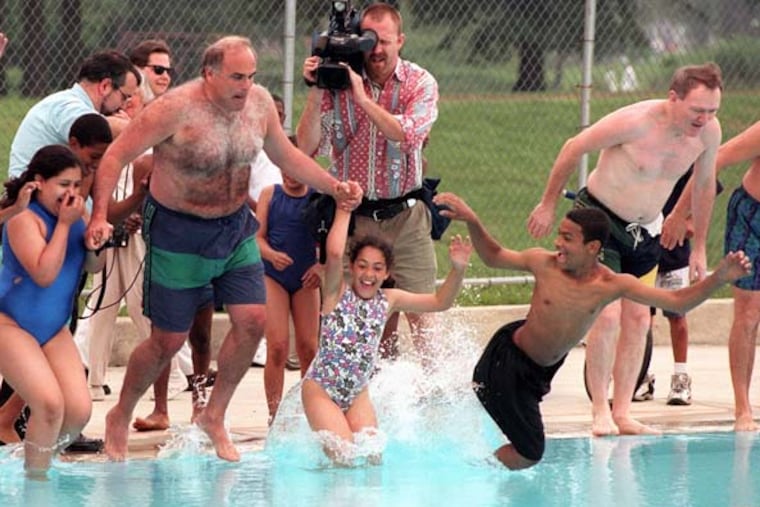Mayor Kenney should channel the spirit of Ed Rendell and open all pools, despite financial woes | Opinion
The city faced legitimate obstacles to opening all pools this year — and worked hard to overcome them. But where there is political will, there is a way.

This week, Mayor Jim Kenney’s administration is blaming COVID-19′s effect on lifeguard recruitment for why not all municipal pools are opening. (Full disclosure, I worked in the Mayor’s Office 2016-2019.)
I’m unconvinced. After all, in 1992, Mayor Ed Rendell reopened the pools when the city was nearly bankrupt and Philly was, in the words of the New York Times, “plagued by violence, drugs, AIDS, and unemployment.” Why doesn’t Mayor Kenney have the political courage or acumen to do the same, instead of blaming COVID-19 for not opening pools?
To be fair, most pools are opening. In a typical year, the city has about 70 pools. This year, it was going to be 68. But it’s about 20 fewer instead. And the poorer zip codes in Philly bear the brunt of the closures: Out of nearly 50 zip codes in Philly, only four had two pools close in them. They’re some of the poorest zip codes in the city: 19133, 19134, 19122, and 19123.
Speaking with Philly Parks and Recreation spokesperson Maita Soukup, I asked why poorer neighborhoods received more pool closures. She insisted it’s an unfortunate coincidence. It looks bad, admittedly, but there’s no malicious intent — at least, to me, in the conscious, explicit bias sense. But it’s hard to look at this and not see America’s long-standing brutalization of poor, especially Black, people manifest implicitly in an otherwise banal administrative practicality.
» READ MORE: Here are the city pools that will be opening in Philly this summer
The city determined which pools to close using a variety of parameters, including past years’ attendance and proximity to other pools. North Philadelphia has a large concentration of pools, the city’s thinking goes, so closing a couple there — as opposed to, say, Northeast Philly which has fewer pools — will have a smaller impact on residents.
Or will it?
City services are concentrated in areas for a reason, and areas that are extremely hot compared to other parts of the city with few green spaces, like North Philly, probably ought to have more pools. The administration’s own Office of Sustainability points to North Philly as an area that is in dire need of cooling off.
This isn’t to say that the city had an easy task when it comes to opening pools. It’s true that COVID-19 presented challenges logistically. Lifeguards are on a two-year certification schedule, so one summer off decimates the applicant pool.
And until recently, the city had no idea if enough vaccines would get in arms to allow us to relax indoor gathering prohibitions. Given the city relies on indoor pools on School District property for training and certification, and it could not do so this year, this was a serious hurdle. It’s a testament to their hard work that we have any lifeguards.
They even spent time and resources heating an outdoor pool in winter so they could adhere to social distancing requirements and get as many lifeguards as possible. They launched a massive recruitment campaign.
But as is happening nationwide, workers weren’t budging at the advertised starting rate. A paltry 50-cent increase didn’t solve the problem, either.
Today, instead of the 350-400 lifeguards the city says Philadelphia needs for full operations, we have little more than half of that.
This is a problem caused by a City Council that didn’t prioritize pools during the budget process and a mayoral administration that is now more interested in treading water than swimming laps.
Why didn’t the city do more? Why not undercut the shore towns and offer lifeguards a special post-COVID rate of $25 per hour?
Avalon and Stone Harbor both increased lifeguard starting hourly rates to $20 per hour which ended their recruitment woes. “Where guards were hard to come by in 2019, now Avalon’s patrol is turning candidates away,” reports Josh Axelrod for NJ.com. “Currently, the patrol has 15 spots and 137 applicants.”
» READ MORE: Why city pools matter, and how to find a pool in Philly this summer | Elizabeth Wellington
The city tells me lifeguarding is a civil service position bound by those rules in terms of pay. But creative problem solving and coalition building is part of governance. Why couldn’t our elected leaders work with our unions on a special post-pandemic initiative to serve the city’s most vulnerable residents?
Parks and Rec provides lifesaving, evidence-based programming to our most vulnerable residents. The city in turn expects them to perform miracles on a shoestring.
Close the libraries, shutter the pools, pay these workers a pittance, and balance the budget on the backs of kids in the neighborhoods has been our city’s approach for too long.
Any pools being shuttered is unacceptable.
Remember the photo of a swimming-trunks-clad Ed Rendell leaping joyously into a municipal pool alongside screaming happy children? Not only did Rendell open the pools amid a dire financial picture, but he also showed up as mayor and was willing to do something kind of silly that sent a vitally important message: We’re all in this together and some things are just too important to not do.
Josh Kruger is an award-winning (and losing) writer in Philadelphia.